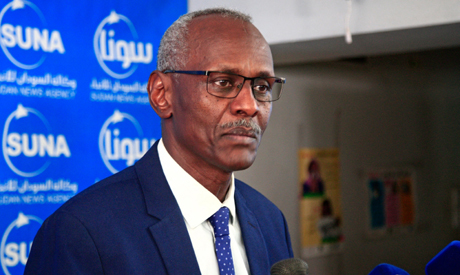
Sudan's Minister of Irrigation and Water Resources Yasser Abbas holds a press conference in the Sudanese capital Khartoum on June 14, 2021. AFP
Sudanese Irrigation Minister Yasser Abbas said n a press conference held in Khartoum on Monday that “going forward with the second filing of the Grand Ethiopian Renaissance Dam (GERD) without a legally binding agreement is dangerous for all parties,”
He also added that Sudan will head to the UN Security Council over Ethiopia’s unilateral actions over the GERD.
Abbas said that Egypt and Sudan are coordinating and continuing to work in order to resume the negotiations path.
Both Egypt and Sudan have been insisting on reaching a legally binding agreement on the filing and operation of the GERD before its second filing by Ethiopian authorities in July.
Last April, the latest round of talks between the three countries over the GERD in Kinshasa reached a deadlock, leading to the collapse of the talks.
Abbas said that there had to be a way to change the methodology of the negotiations in the GERD talks by enlisting the help of other institutions and political actors, like the African Union (AU), the EU, and the US.
Sudan has already proposed the formation of a quartet committee that would include the US, UN, EU, and the AU to mediate in the talks, however, despite Egypt’s approval, Ethiopia rejected the proposal and called it an attempt to take the matter outside of Africa.
On the other hand, the Sudanese minister stated that “Khartoum is open to a partial temporary agreement concerning the GERD but with conditions.”
Abbas also revealed that Sudan did not mind reconsidering the Nile’s water shares under certain conditions.
“Ethiopia has put a set of impossible conditions in order not to reach a legally binding agreement concerning the GERD,” Abbas said, adding that this matter violated the Declaration of Principles (DoPs) signed by the three countries over the GERD in 2015.
The DoPs is an agreement signed between the three countries in March of 2015 that obliges Ethiopia to cooperate with Egypt and Sudan in filling and operating the dam. The agreement also mandates the use of mediated negotiation in the event of a dispute arising from differences in the interpretation or application of the declaration of principles.
Abbas revealed that Sudan rejected an Ethiopian suggestion concerning the exchange of GERD information because it did not include a legally binding agreement.
“We are the country that will be mostly impacted by the GERD,” said Abbas during the press conference, adding that the dam was threatening the safety of dams and citizens in his country.
Sudan fears the GERD will put the operation of its Roseires dam and the lives of 20 million Sudanese citizens at “a very high risk” if an agreement regulating the operation and filling of GERD is not reached before the second filling.
Nevertheless, the Sudanese minister said that Sudan did not change its stance concerning the GERD and considers it a useful project, but reaching a legally binding agreement was important.
Abbas’ statements come right before Arab foreign ministers are set to hold a meeting in Doha, Qatar on Tuesday to discuss the latest developments in the GERD files and ways to support Egypt and Sudan.
Short link: